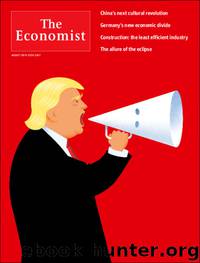The Economist 19 August 2017 by The Economist

Author:The Economist
Language: eng
Format: mobi
Tags: The Economist
Publisher: The Economist
Published: 2017-08-17T17:00:00+00:00
Return of the crooner
Silvio Berlusconi may manage a political comeback
At 80, he can still astonish
Aug 17th 2017 | ROME
TO ANYONE outside Italy it may seem unthinkable. But the hottest political topic in a searing Italian summer is the expected resurrection of Silvio Berlusconi. Ejected from office by his own lawmakers in 2011, and convicted of tax fraud two years later, the TV and property magnate-turned-politician will be 81 next month. Still derided for hosting Bacchic “Bunga Bunga” parties while running the country, Mr Berlusconi is due to go on trial, charged with bribing his young female guests to perjure themselves in earlier proceedings. Yet, as one commentator noted, on his return from the summer recess in September, modern Italy’s longest-serving prime minister can expect to be “treated with respect by all”.
Why? Mr Berlusconi’s party, Forza Italia, has barely crept back from the low point it hit two years ago when it was winning only 10% of the national vote in polls and was overtaken by the Northern League. Forza Italia still trails the more radical, populist League, and faces a new threat from its leader, Matteo Salvini, said to be planning to consolidate his leadership of the Italian right by changing his party’s name to give it nationwide appeal.
The reasons for Mr Berlusconi’s rosy prospects are the alignment of two other political factors. One is the bizarre state of Italy’s electoral law—or rather, laws. There are two, one for each house of parliament, and since 2014 the constitutional court has struck out crucial provisions in both. What remains is close to proportional representation in its purest form, which encourages fragmentation. Italy’s president, Sergio Mattarella, has urged parliament to revise and harmonise its two laws, but an attempt to do so foundered in June.
Reform looks unlikely in time for the next general election, which is due by May. With the centre-left Democratic Party (PD) unable to muster more than 30% of the vote, and the two main right-wing parties each polling less than half that, the balance of power is likely to be held by Beppe Grillo’s anti-establishment Five Star Movement (M5S), which also hovers in the high 20s in the polls. But the M5S refuses to join a coalition with any of the mainstream parties, the second explanation for Mr Berlusconi’s rising fortunes. The only foreseeable way to avoid a stalemate would be a government formed, or supported, by centrist elements of the left and right. Forza Italia, though solidly right-wing in many respects, is a more moderate option than either the League or another, smaller, conservative group, the Brothers of Italy.
Mr Berlusconi is spending the summer framing a programme that borrows from both left and right as the M5S, which sees itself as post-ideological, has done. His ideas are said to include a flat rate of income tax; a big rise in the level at which it becomes payable; an increase in the minimum pension, and the introduction of a safety-net benefit for those with no other means of
Download
This site does not store any files on its server. We only index and link to content provided by other sites. Please contact the content providers to delete copyright contents if any and email us, we'll remove relevant links or contents immediately.
Waking Up in Heaven: A True Story of Brokenness, Heaven, and Life Again by McVea Crystal & Tresniowski Alex(37003)
Still Foolin’ ’Em by Billy Crystal(35542)
Cecilia; Or, Memoirs of an Heiress — Volume 1 by Fanny Burney(31332)
Cecilia; Or, Memoirs of an Heiress — Volume 3 by Fanny Burney(30934)
Cecilia; Or, Memoirs of an Heiress — Volume 2 by Fanny Burney(30889)
Fanny Burney by Claire Harman(25784)
Empire of the Sikhs by Patwant Singh(22172)
We're Going to Need More Wine by Gabrielle Union(18072)
Plagued by Fire by Paul Hendrickson(16636)
Hans Sturm: A Soldier's Odyssey on the Eastern Front by Gordon Williamson(16620)
Out of India by Michael Foss(16312)
Cat's cradle by Kurt Vonnegut(13866)
Molly's Game by Molly Bloom(13353)
Bombshells: Glamour Girls of a Lifetime by Sullivan Steve(13108)
Pimp by Iceberg Slim(12931)
All the Missing Girls by Megan Miranda(12747)
Leonardo da Vinci by Walter Isaacson(11901)
4 3 2 1: A Novel by Paul Auster(11047)
The Radium Girls by Kate Moore(10907)
